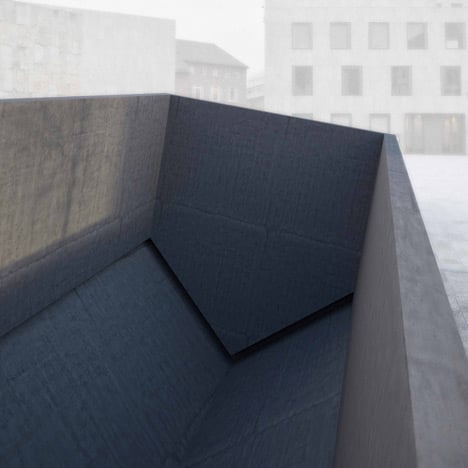
Memorial to all victims by Martin Papcún and Adam Jirkal
Designer Martin Papcún and architect Adam Jirkal of Atelier SAD want to immerse an upside-down shell of a house into the ground of St. Jakob’s Square in Munich.
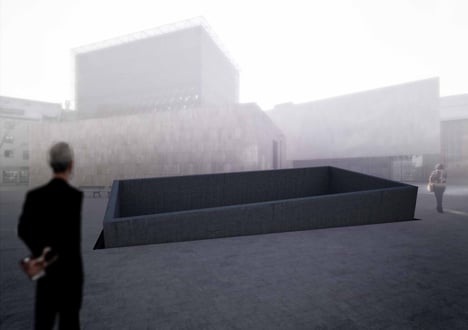
The proposals were drawn up as an entry to a competition organised by the City of Munich for the design of public art installations.
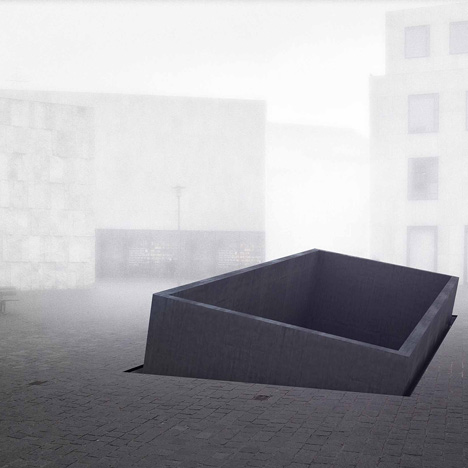
Envisioned as a memorial, the structure would commemorate all unnamed victims of war or violence in the city, specifically those caught up in conflict they didn't choose to participate in.
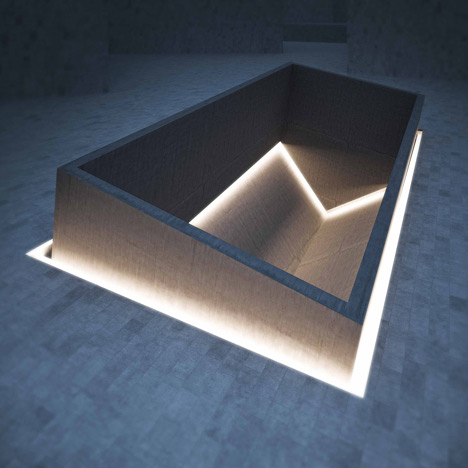
The empty house would be formed from sand-blasted concrete, with a narrow illuminated gap between the walls and roof.
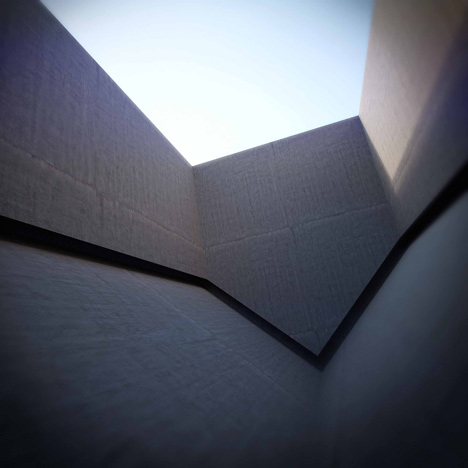
The base of the structure would protrude up from the ground just enough to create a parapet that prevents anyone falling in.
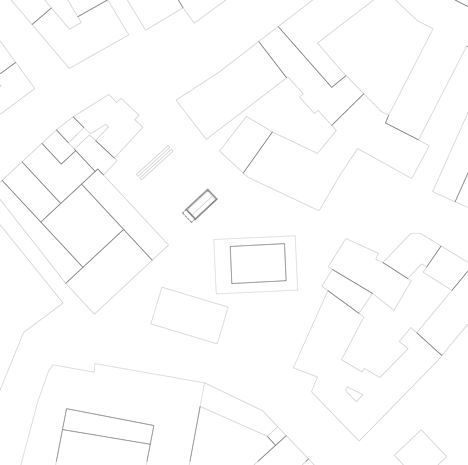
The winners of the competition have yet to be announced.
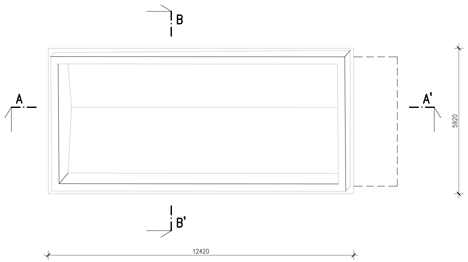
We recently counted down the ten most popular memorials that have been on Dezeen - see them here.
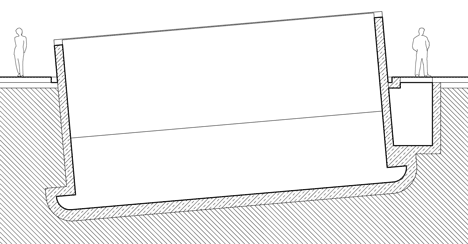
Visualisations are by Michal Nohejl.
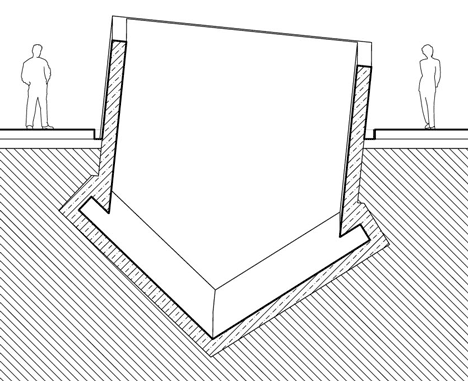
Here's the full project description from Martin Papcún:
Memorial for all victims “House — Minster”
House as a diary of our being
Every human’s live is an outstanding abandoned indelible mark, whether in a shape of tangibly handled “stories”, or mere imprint in us.
Our being is energy which is self transformed and self fulfilled in to our physical world.
Life of everyone of us has its strong specific way which is influenced and makes influences during effusion.
In any war conflict, totalitarian and violent regime, natural disaster or civil accident there are victims – people who are forced in to circumstances they don’t want and don’t want to participate in; they are thrown in to situation, which doesn’t allow them act freely and make independent decisions.
Often they are unnamed, fought by their own destiny in to “abyss” from which there is no escape and no way to win.
Any one of us assumedly has never heard about them, never met them, but imprint of their lives is lasting, is here and doesn’t disappear.
We could often come across places without visible marks of change, where we feel stigmatisation left by horror, tragedy and pain, and those places are the bearers of memories.
It is about something that is difficult to express through substance but we can feel it from inside and can define it by personal feelings.
Imprints of lives outlived can be recognised in modern day’s matter.
Memorial of all victims is dedicated to the people who were not heroes but they left somewhere their own indelible imprint. We are learning on their destiny how to repair our own mistakes and mistakes of others.
Archetypal building “House — Minster”
House is a universal place of our lives, centre of family, love, work, trust and contemplation, shelter in which we are hiding and it is a space for our eternal sleep.
Our private and social lives are connected with home / house / building – place of living and working. Thus the matter defining place/space is witnessing the passing of our live.
House is not just a building; it’s the point and centre of our home. Our memories, our energy, and our lives are imprinted there.
Everything that happened in our live is transformed inside us and has an influence on surroundings. This impact is denoted and absorbed by space around us.
We can sense this untouchable imprint but we can’t catch it and frame it in words.
Energy goes through the walls, has no borders, no limits. Places, spaces and buildings are stigmatised by us.
Subject of the Memorial
Negative form of archetypal shape of a house is a definitive space determined by the matter around. “Inside” matter is missing, similar to our past caught only by memories.
Shape of the House is defined by side walls and roof made from black/gray matt sand blasted concrete. The House will be turned upside down, turned a bit on two axis and immersed by 4/5 in to the ground. This turned imprint of a building, house and minster – is archetypal place of first and last hide.
It is the place of transcendence, contemplation, recollection and grief.
- negative imprint in matter, in earth–definition of non material space, the duality of matter
- symbol of the untouchable past imbedded with vivid memories
- you can look down, look back, through and behind materialising memory’s essence
- visual change over from present and material world (over ground) to viewpoint in to “nothing”, to non–touchable (underground)
- self reflection, a glance inside us in a quiet non–space
- the turn of the House is a reflection on ephemeral essence of being and clinging to all material
Positioning
Place at St. Jakobs–Square was chosen for its historical context, with Ohel–Jakobs Synagogue and Israelitische Kultur congregation, and also for the architectural quality of surrounding buildings.
The absence of matter in the Memorial is a kind of transcendental dimension inside everyone who would step in the visually overcrowded social space of the Square.
This place is about taking a brake for thought, an opportunity to immerse oneself in to transcendental dark / light space inside of each of us.
The Memorial place is in the centre of the Square, in dialog with surrounding buildings. It does not get in a way of passers– by or residents returning home. It invites you to come over and stay for a while. Graduation of the Memorial’s height allows non–obstructed observation of the surrounding buildings and the turn on two axis creates points of various heights in the composition.
A first time viewer will see space defined by black/grey wall, and undefined matter inside. But the closer view will show negative imprint of hollow house immersed in to the ground.
As the viewer comes closer to the Memorial the depth and the negative imprint inside the house will reveal themselves.
A step nearer to the edge and a glance inside will present full view on the imprinted house and the missing contents.
The Memorial is turned and placed in such a way that its lowest point for viewing is in the direction of the open space of the Square.
Inside the memorial side walls are not touching the roof separated by space between them. This space is in shadow during the day and effulge light at night. The roof seems to be levitating in the underground space as if the minster is floating in another dimension.
Visual disconnection from surrounding space above creates a feeling of calmness. Glance in to the empty space, in to dark is a symbol of a shared journey with the ones we meet.
At night the shadows are changing in to intensive effulge light. It is so intense that a viewer will loose ability to visually comprehend what is inside.
Where is the beginning there is the end. Absorption by darkness is alternated by absorption by light.
The level of the upper part of the House is gradually rising alongside the walls creating natural barrier against accidents.